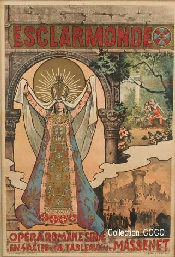
06 Apr 2008
MASSENET: Esclarmonde
Esclarmonde: Opéra romanesque in four acts and eight tableaux.
Mozart and Salieri, an opera in one act consisting of two scenes.
Nicolai Rimsky-Korsakov (1844-1908), composer. Libretto derived from Alexander Puskhin's play of the same name.
First performance: 7 December 1898 in Moscow.
Ariadne auf Naxos, Oper with a prologue and one act. Music composed by Richard Strauss. Libretto by Hugo von Hofmannsthal.
La Vestale, a tragédie lyrique in three acts.
Boris Godunov, an opera in four acts with prologue
Modest Mussorgsky, composer. Libretto by the composer, based on Alexander Pushkin's drama Boris Godunov and Nikolai Karamazin's History of the Russian Empire
First performance: 8 February 1874 at the Mariinsky Theatre, St. Petersburg
Il Trovatore, dramma in four parts.
Only a few months following the premiere of Der Rosenkavalier, Hugo von Hofmannsthal proposed a new opera to Richard Strauss based on Molière’s comedy-ballet, Le Bourgeois gentilhomme (in German, Der Bürger als Edelmann).
Die Entführung aus dem Serail, Singspiel in 3 Acts.
Music composed by Wolfgang Amadeus Mozart (1756–1791). Libretto by Johann Gottlieb Stephanie the Younger, based on an earlier libretto by
Christoph Friedrich Bretzner.
Die Entführung aus dem Serail, Singspiel in 3 Acts.
Music composed by Wolfgang Amadeus Mozart (1756–1791). Libretto by Johann Gottlieb Stephanie the Younger, based on an earlier libretto by
Christoph Friedrich Bretzner.
Arabella: Lyrische Komödie in three acts
Die Entführung aus dem Serail, Singspiel in 3 Acts.
Music composed by Wolfgang Amadeus Mozart (1756–1791). Libretto by Johann Gottlieb Stephanie the Younger, based on an earlier libretto by
Christoph Friedrich Bretzner.
La Gioconda, dramma lirico in four acts.
Music composed by Amilcare Ponchielli (1834–1886). Libretto by Arrigo Boito (under the pseudonym Tobia Gorrio), based upon Victor Hugo's Angelo, Tyrant of Padua (1835).
Don Carlo, an opera in four acts. Music composed by Giuseppe Verdi (1813–1901). Libretto by Joseph Méry and Camille Du Locle after Friedrich von Schiller’s dramatic poem Don Carlos, Infant von Spanien. Revised version in four acts (French text revised by Du Locle, Italian translation by Achille de Lauzières and Angelo Zanardini).
Un ballo in maschera, a melodramma in three acts.
Music composed by Giuseppe Verdi. Libretto by Antonio Somma, based upon the work of Eugène Scribe Gustave III ou Le bal masqué (1833)
Medea: Melodramma tragico in three acts.
Die Tote Stadt, an opera in three acts.
Music composed by Erich Wolfgang Korngold (1897-1957). Libretto by Paul Schott (Julius and E. W. Korngold) after the novel Bruges la morte by Georges Rodenbach.
Some Details concerning the Revolution inaugurated by Rossini
Manon Lescaut, dramma lirico in quattro atti
Elektra: Tragedy in one act.
Lyric Opera of Chicago has announced both schedules and cast-lists for is Spring 2020 performances of Richard Wagner’s Ring Cycle. Given the series of individual productions already staged by the company since Fall 2016, that pave the way for the complete cycle, Lyric Opera of Chicago’s complete production should affirm the artistic might of the great composer.
“Diacono himself does not know what musical talent he possesses” – Mascagni

Esclarmonde: Opéra romanesque in four acts and eight tableaux.
Streaming Audio
Music composed by Jules Massenet. Libretto by Alfred Blau and Louis de Gramont after the French romance Partonopeus de Blois.
First Performance: 14 May 1889, Opéra-Comique (Théâtre Lyrique), Paris
| Principal Characters: | |
| Emperor Phorcas | Bass |
| Esclarmonde, his daughter | Soprano |
| Parséïs, her sister | Mezzo-Soprano |
| Enéas, a Byzantine knight, fiancé to Parséïs | Tenor |
| Chevalier Roland, Count of Blois | Tenor |
| Cléomer, King of France | Baritone |
| The Bishop of Blois | Baritone |
Synopsis:
Act I
Phorcas, the Emperor of Byzantium, abdicates in favor of his daughter, Esclarmonde. He bestows upon her magical powers on the condition that she must ascend the throne alone until the end of her twentieth year. Then, a tournament will be held in which the victor will become her bridegroom. In the meantime, Esclarmonde's face must remain veiled. Esclarmonde confesses to her sister, Parséïs, to be in love with the knight, Roland. King Cléomer, however, has decided to have his daughter, Bathilde, marry Roland. Esclarmonde sends her beloved to an enchanted island, where she will seduce him. There Roland awakens in the arms of the princess. She offers to become his bride and to give him honor and glory, provided that he never discloses her identity. The next day Roland departs to Blois, which is under seige by the Saracens. Esclarmonde promises him that she will visit him every night wherever he may be. She gives him a magic sword.
Act II
Roland, victorious over the Saracens, refuses the hand of the princess Bathilde without explanation. The Bishop of Blois becomes suspicious and determines to force Roland to reveal his secret. Esclarmonde arrives that night. As the two lovers embrace, the Bishop enters and exorcizes Esclarmonde Her veil is torn off. She bids goodbye to Roland and disappears, escorted by the spirits of the fire.
Act III
Phorcas awkens his daughter and enjoins her to renounce Roland. Otherwise, he will die. Desparate, Roland enters a Byzantine tournament seeking death. Roland wins the tournament and, of course, Esclarmonde. The princess may now express her love and reveal her face.